Tuesday’s primary elections will show the effects of Trump and Clinton’s candidacies in down-ballot races.
- Donald Trump annouced late Tuesday he’s headed to Mexco for meeting with country’s president
- Marco Rubio, John McCain face pro-Trump challengers in Tuesday’s primaries
- Clinton continues to outpace Trump on ad spending
- What does Barry Goldwater’s presidential campaign say about Trump’s chances with black voters?
- Share via
Trump glosses over immigration on the eve of his meeting with Mexican president
The night before Republican presidential nominee Donald Trump was scheduled to meet with the president of Mexico and deliver a long-awaited speech on immigration, he barely mentioned his signature issue at a boisterous rally in Washington state.
There were no calls to build a border wall and make Mexico pay for it, or a deportation force to deal with the millions of people who are in the country illegally. Instead, the sole reference to immigration at the Everett, Wash., rally Tuesday night focused on the drug epidemic.
“We are also going to secure our border and stop the drugs from pouring in and destroying our country,” Trump said. “And I’ll be talking about that tomorrow night in Arizona -- big speech on immigration, Arizona tomorrow night.”
He went on to cite large increases in heroin overdoses in the Seattle area. “It’s getting worse; it’s getting horrific,” he said.
Trump made the remarks shortly after he tweeted that he would be meeting with Mexican President Enrique Pena Nieto on Wednesday, before he delivers his immigration speech amid questions over whether he was softening the hard-line stance he took on the issue during the Republican primary.
Trump also pushed back at Democratic nominee Hillary Clinton’s recent argument that he does not represent the mainstream Republican Party because of his incendiary statements about various groups and his support from racists.
Trump, who said he was proud to represent the party of Abraham Lincoln, pointed to Democrats’ past support of slavery and opposition to civil rights. “It is the Democratic Party that is the party of slavery, the party of Jim Crow and the party of opposition,” he said.
Democrats largely lost the South after they abandoned such positions.
Trump’s remarks were overshadowed by news of his trip. He was to be accompanied by Sen. Jeff Sessions of Alabama and former New York City Mayor Rudolph W. Giuliani, according to Bloomberg News.
- Share via
Sen. John McCain wins primary contest in Arizona
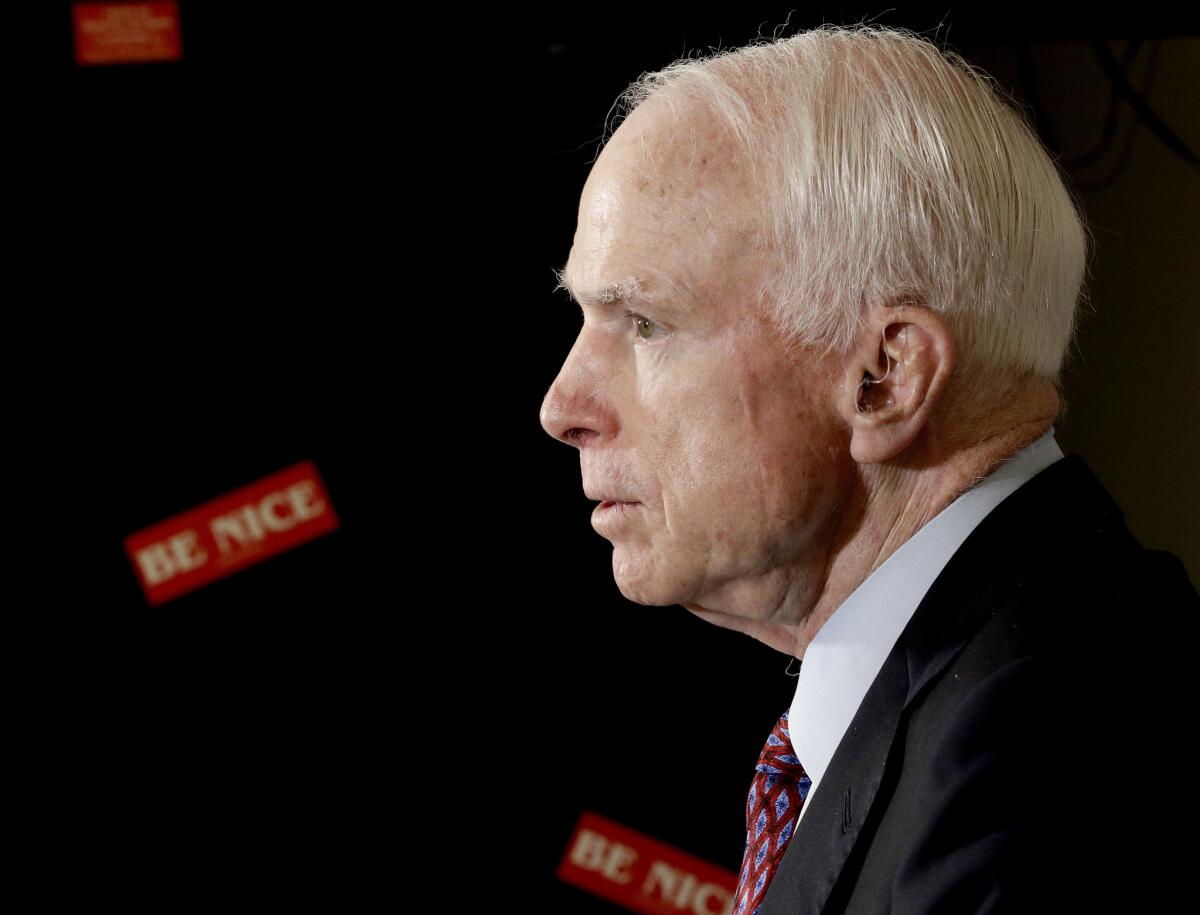
He’s served in the Senate for nearly three decades, but never has John McCain faced a reelection like this year.
The reason? Donald Trump, the Republican presidential nominee, who has been a persistent presence in McCain’s bid for another term.
On Tuesday, McCain defeated his main challenger in the Republican primary, Kelli Ward, a former state lawmaker and staunch Trump supporter. Based on initial returns, McCain outpaced Ward by double digits, enough for the Associated Press to call the race.
Throughout the primary, Ward consistently assailed McCain for his “tepid” support of Trump, seeking to exacerbate rifts that have developed over the years between the Arizona senator and the party’s base, who for the most part are in lockstep with Trump. The tactic by Ward forced McCain to repeatedly field questions about his views on Trump, leaving little discourse about issues that pertained specifically to Arizona.
The relationship between McCain and Trump has been tense.
In recent weeks, McCain, who has said he will support Trump this fall because he’s the party’s nominee, has condemned the billionaire businessman for his public criticism of a family whose son was killed while serving in Iraq.
And last year, shortly after Trump entered the presidential race, he publicly mocked McCain’s military service.
“He’s not a war hero.... He’s a war hero because he was captured. I like people that weren’t captured,” Trump said at the time of McCain, who was a prisoner of war in Vietnam for nearly six years.
McCain, whose state has a growing Latino population, now faces Democratic U.S. Rep. Ann Kirkpatrick. She’s assailed McCain for his support of Trump, whose comments about some Mexican immigrants being “rapists” could hurt the longtime senator in the increasingly diverse state.
Still, a recent CNN/ORC poll showed McCain up by 13 percentage points in a head-to-head matchup with Kirkpatrick.
On Wednesday, Trump is set to deliver a major immigration speech in Phoenix. As of Tuesday night, McCain was not expected to attend.
- Share via
Donald Trump to travel to Mexico to meet with Mexican president Wednesday
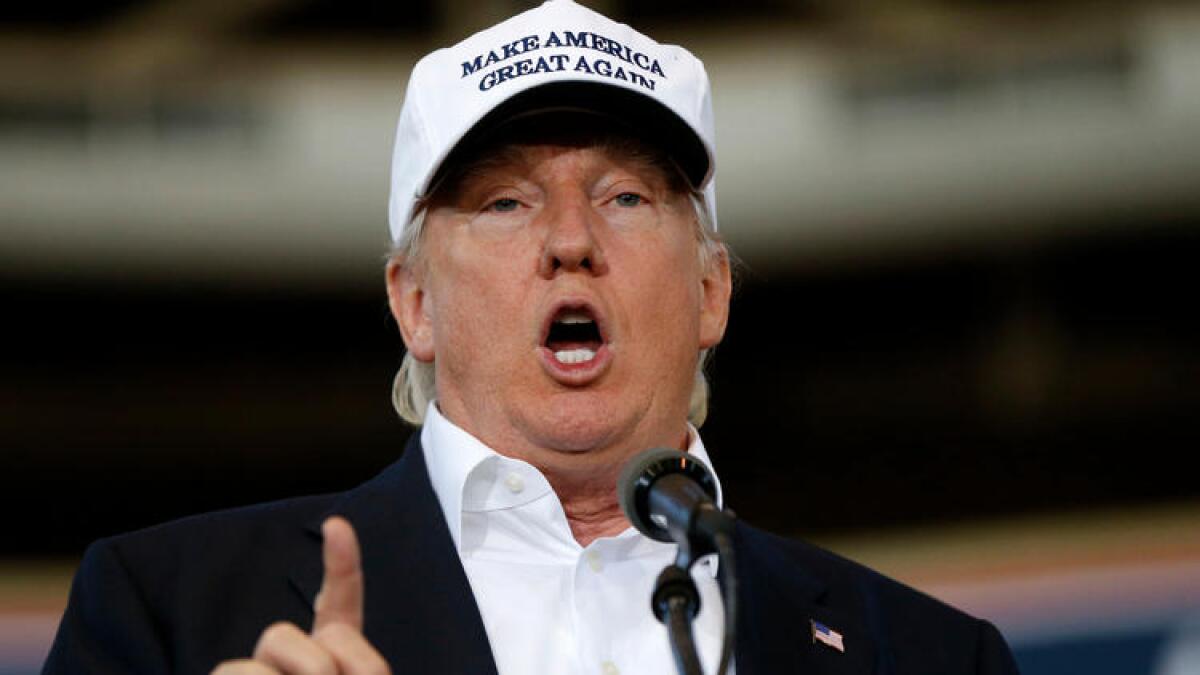
Republican presidential candidate Donald Trump will travel to Mexico on Wednesday to sit down with Mexican President Enrique Pena Nieto, both politicians confirmed Tuesday night.
“I have accepted the invitation of President Enrique Pena Nieto, of Mexico, and look very much forward to meeting him tomorrow,” Trump said in a Tweet.
Pena Nieto’s office said in its own Tweet that the two will meet privately Wednesday. Pena Nieto’s office said in a statement Tuesday that the Mexican president extended an invitation for a meeting Friday to Trump as well as his rival, Democratic presidential candidate Hillary Clinton.
The unlikely meeting between the Mexican president and Trump, who has repeatedly railed against Mexican immigrants for bringing crime and taking jobs away from U.S. workers, comes just hours before Trump is scheduled to deliver a major policy speech on immigration in Arizona Wednesday night.
- Share via
Donald Trump headed to Mexico
- Share via
Stage actors union makes historic endorsement for Clinton
The union representing more than 50,000 stage actors and managers has officially weighed in on one of the biggest shows of the year: the presidential election.
The Actors’ Equity Assn. voted Tuesday to endorse Democratic candidate Hillary Clinton — the first time in the group’s 103 years of existence that it has taken sides in a presidential race.
Union members were compelled to make their voices heard during an election that union Councilor Francis Jue said was about such issues as “whether people can carry guns into theatres.”
The statement from Actors’ Equity reads:
“Our union has historically chosen to remain nonpartisan and above the fray. But at such a critical time in our country’s history, this union does not have that luxury if we hope to protect our members. We have to fight with everything we have for our survival. God forbid we stand passively on the sidelines and watch as some of these people get elected, people who aggressively want to dismantle unions. We will look back at this moment knowing that we could have said something and we chose not to because we were afraid people wouldn’t like it. I don’t think that’s the way a union in 2016 America can afford to operate.”
Clinton took inspiration from Broadway during her Democratic National Convention speech.
“Though we may not live to see the glory, as the song from the musical ‘Hamilton’ goes, let us gladly join the fight,” she said.
- Share via
Sen. Marco Rubio staves off primary challenge for his Florida seat
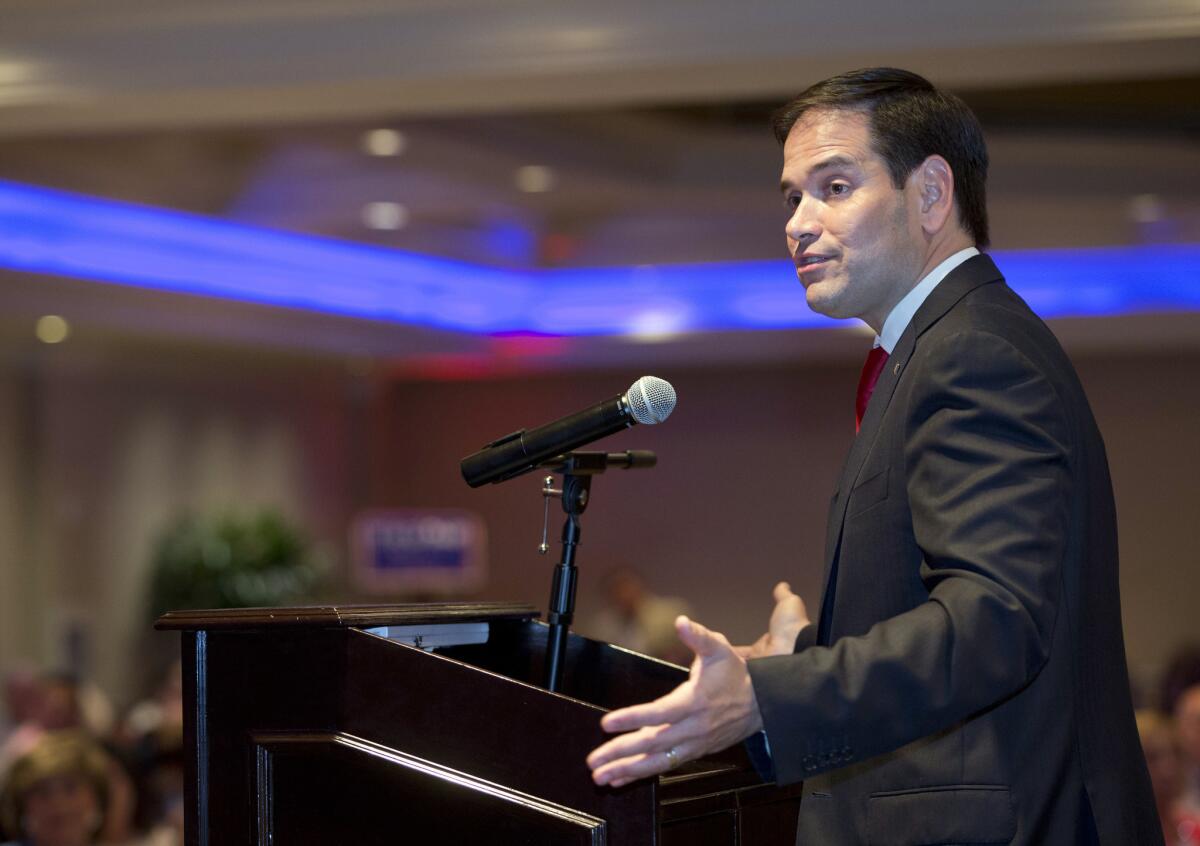
After waging an unsuccessful bid for the Republican presidential nomination, Sen. Marco Rubio sought — at the last minute — reelection to his Florida seat.
And on Tuesday he staved off a primary challenge from wealthy developer Carlos Beruff to advance into a November battle with Democratic Rep. Patrick Murphy, where Rubio is certain to face questions surrounding his endorsement of Donald Trump.
Trump also endorsed Rubio in his reelection bid, despite a bitter presidential primary — rife with personal insults — in which the two sparred on, among other things, immigration.
During an interview with CNN on Tuesday, Rubio showed division still lingers with Trump on the issue, saying he does not agree with the idea of deporting all of the estimated 11 million people living in the country illegally or that Mexico will pay for a border wall — key pillars of Trump’s immigration plan. Still, Rubio expressed a willingness to campaign alongside Trump in Florida this fall.
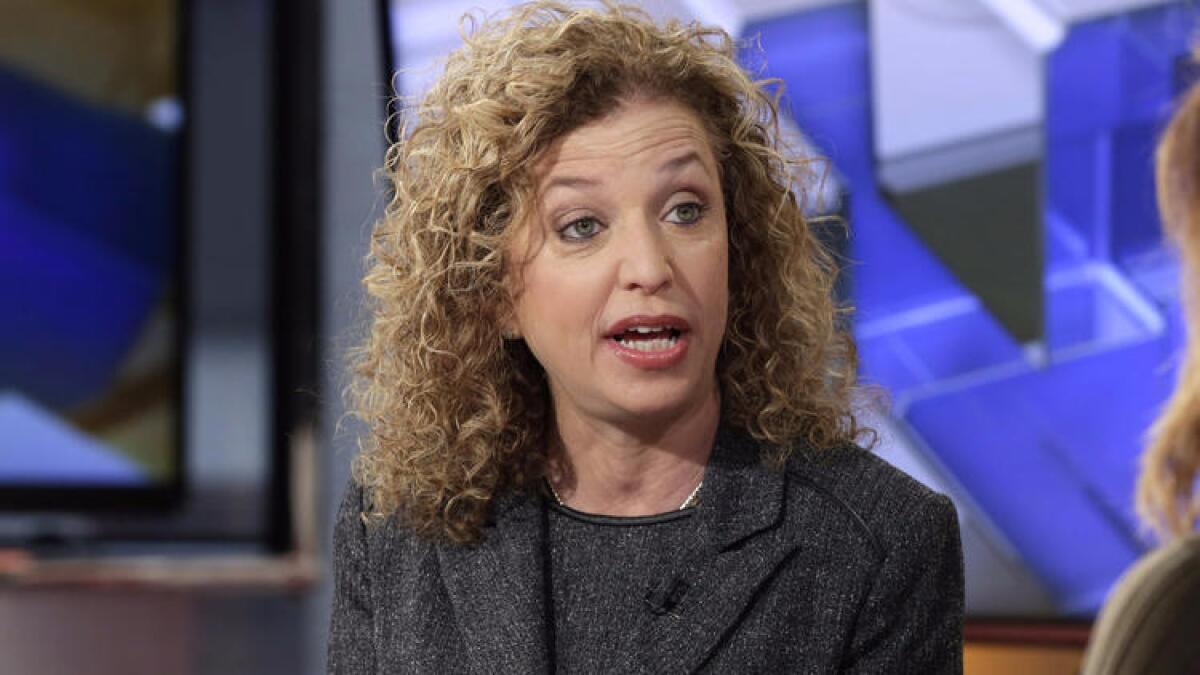
Farther down-ticket and on the Democratic side in Florida, Rep. Debbie Wasserman Schultz easily won in the primary for her Miami-area congressional seat. She’s faced a challenge from businessman Tim Canova.
Wasserman Schultz, former head of the Democratic National Committee, resigned from that post last month after leaked emails showed partiality by some DNC members for Hillary Clinton in her primary battle against Vermont Sen. Bernie Sanders.
Sanders had called for Wasserman Schultz’s resignation long before the email leak — citing his belief that she tipped the scales in the primary for Clinton. He endorsed Canova but did not make any campaign appearances in South Florida to show his support for the businessman.
Update: 6:21 p.m. This post was updated with results that showed Wasserman Schultz won her primary.
- Share via
Trump to attend big-dollar fundraiser Sept. 12 in Chicago suburb
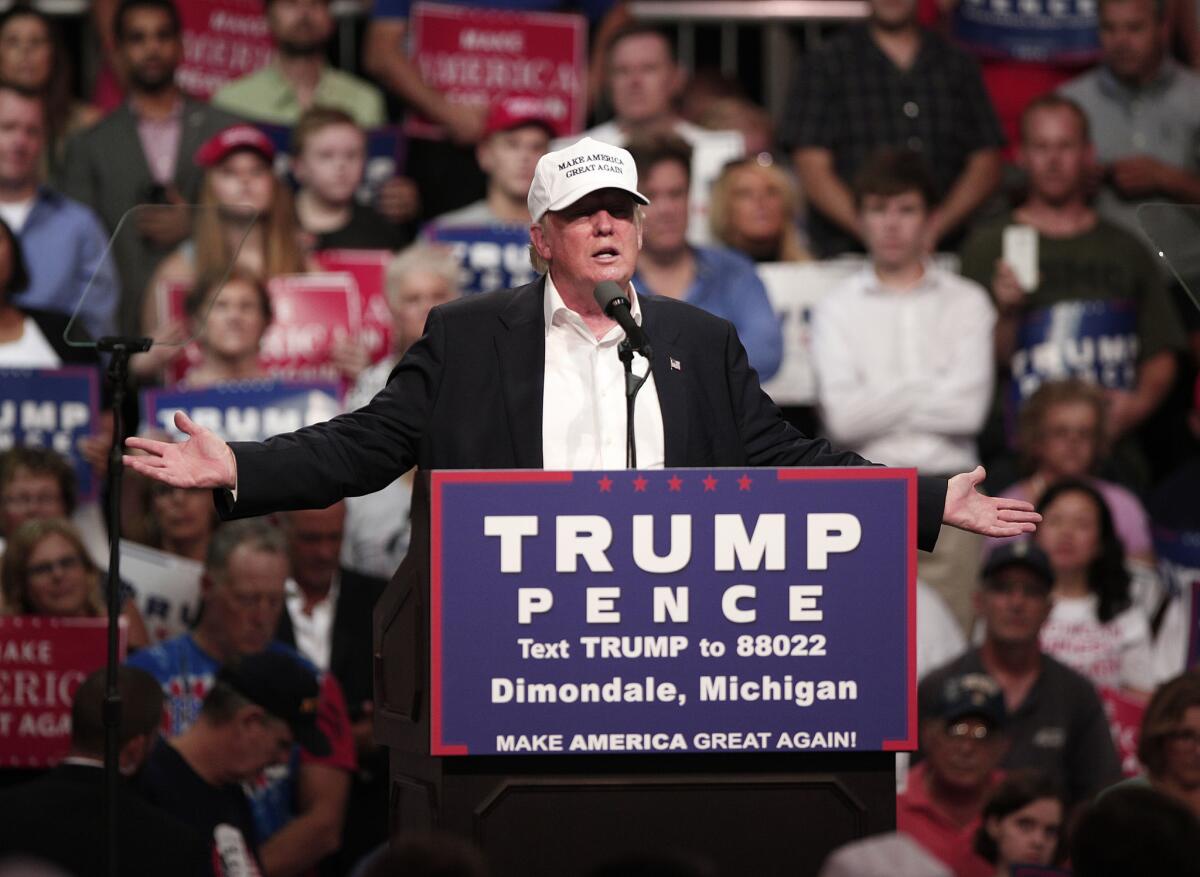
Republican presidential nominee Donald Trump will appear at a big-dollar luncheon fundraiser Sept. 12 outside Chicago.
Attendees at the event at the Bolingbrook Golf Club, in Bolingbrook, Ill., will contribute as much as $250,000 per couple, according to a copy of the fundraiser invitation. Top tickets include “prime seating,” a “photo opportunity” and a place at a special “VIP roundtable” prior to the luncheon, which is cohosted by Bolingbrook Mayor Roger Claar.
- Share via
Meg Whitman stumps for Hillary Clinton, demurs when asked about Cabinet post
Republican billionaire Meg Whitman, in her first appearance on the campaign trail for Hillary Clinton, wouldn’t rule out serving in a Cabinet position if the Democratic presidential nominee wins the White House in the fall.
“We’ll see what happens,” Whitman told KUSA-TV in Denver, adding that she enjoyed her life in California and was committed to Hewlett-Packard, where she is chief executive.
Whitman, a lifelong Republican who unsuccessfully ran for governor in California in 2010, has previously made clear her distaste for GOP presidential nominee Donald Trump. She has called him a “dishonest demagogue” and compared him to Adolf Hitler and Benito Mussolini.
Earlier this month, she endorsed Clinton and pledged to donate to her campaign and help her raise money.
Speaking to business leaders at a breakfast in Colorado, Whitman did not mention Trump by name but said she was “all in” for Clinton.
“The stakes in this election are significant. We have to put country before party,” she said, according to several attendees.
Whitman, who previously served on the GOP presidential campaigns of 2016 candidate Chris Christie, 2012 nominee Mitt Romney and 2008 nominee John McCain, praised Clinton’s “compassion, commitment and courage,” and told the crowd that Clinton would be the steward for the nation’s economy.
“If you are a lifelong Republican, it’s hard to come across [the partisan divide,]” Whitman said, according to the Denver Post. “But I decided that this year it was clear to me that Secretary Clinton’s temperament, leadership experience and commitment to America’s foundational values make her the far better choice for president.”
In interviews with local media, Whitman said she remained a Republican, and after voting for Clinton in November, she would work to rebuild her party.
That may come as a surprise to California Republicans. After Whitman spent $144 million of her own money on her unsuccessful race against Democrat Jerry Brown in 2010, critics say she did little as the state party further eroded.
Trump’s campaign pointed to that loss when asked about Whitman’s efforts for Clinton on Tuesday.
“It’s incredibly disappointing, but it’s more disappointing than surprising,” said campaign manager Kellyanne Conway on Fox News Radio’s “Kilmeade & Friends.” “Let’s remember: Meg Whitman lost her own race by 12 points.” [Whitman actually lost by 13 points.]
Whitman declined an interview request by The Times.
After the Clinton event, Whitman donned a cowboy shirt and hat and attended a charity luncheon with Colorado Gov. John Hickenlooper, a Democrat.
- Share via
Hillary Clinton continues to outpace Donald Trump in ad spending
Hillary Clinton continues to outpace Donald Trump in spending on television ads -- an ongoing trend since the general election campaign began earlier this summer.
Trump, who this month launched his first TV ads in several swing states, is being outspent by Clinton’s campaign by a 10-to-1 margin. In July, it was a nearly 15-to-1 ratio.
So far, Clinton has spent $75 million on general election ads, while Trump has doled out $7.7 million, according to an analysis by NBC News and Advertising Analytics, a firm that tracks ad spending by political campaigns.
Moreover, allies of Clinton, such as the super PAC Priorities USA, have spent nearly $47 million, compared with allies of Trump, which include the National Rifle Assn., who have spent about $15 million.
Aides to Trump insist that the campaign will invest more on advertising after Labor Day -- a strategic move, they say, as more voters will be focusing on the election.
Based on an average of polls by Real Clear Politics, Clinton leads Trump nationally by 5 percentage points. She also outpaces him in several critical battlegrounds, such as Florida and Ohio.
In many of Clinton’s ads, the Democratic nominee uses Trump’s own words to make her case that he’s divisive and unfit to become president, highlighting among other things his comments on the looks of certain women and his labeling some Mexican immigrants as “rapists.” The support of both women and Latinos in various battleground states is critical to victory.
Trump’s first ad sought to cast the United States as less safe under a Clinton administration. In an ad released Monday, he focused on the economy, promising lower taxes and job creation.
- Share via
Can Donald Trump win over black voters? Ask Barry Goldwater
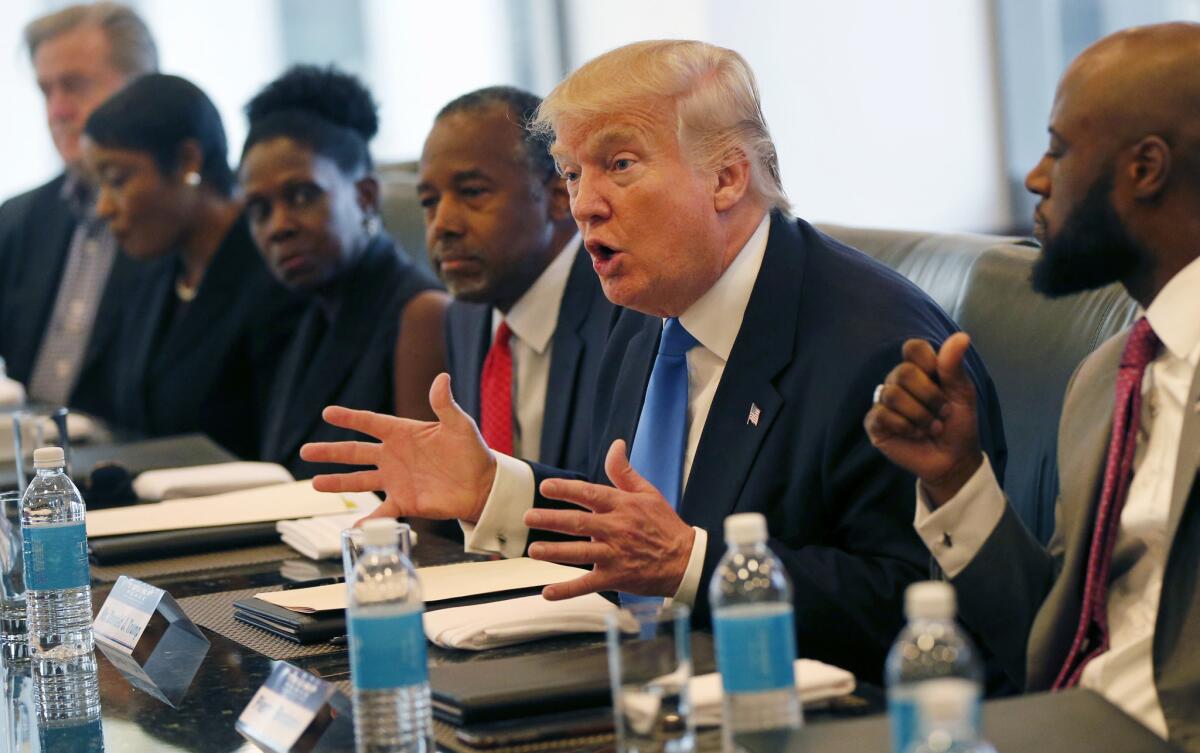
Donald Trump is heading to Detroit this week to visit a black church and to try to convince African Americans -- and really, all voters -- that he is not racist.
It may be a tough sell. Some polls, including the Associated Press/GfK survey earlier this summer, suggest that half of Americans view Trump as “racist.” He is seen favorably by only 7% of African Americans, the poll said.
But Trump is determined to improve his standing with minorities. They may be smaller in numbers in some states, but minority turnout can tip the balance in such key places as Florida, Nevada, North Carolina and Georgia.
“What the hell do you have to lose?” Trump thundered at a recent campaign rally, inviting black Americans to join his campaign.
Trump makes the case that rival Hillary Clinton is just pandering to black voters, and that Democrats have not delivered. He paints a grim, if broadly simplified, picture of poverty and jobless rates set stubbornly high in many black communities.
Amplifying that view is conservative televangelist Mark Burns, a Trump ally who aimed a series of tweets at Clinton, including a racially-tinged cartoon of her in blackface. Burns later apologized for recirculating it.
Film director Spike Lee told CNN’s Anderson Cooper this week that he doubts Trump will have much success with his outreach to black Americans.
After Trump’s heated rhetoric about minorities -- his criticism that an American-born judge overseeing the Trump University fraud lawsuits can’t do his job because of his Mexican heritage and his reference to “my African American” in describing a black participant at one rally -- it’s a slog, Trump critics say.
“I laugh,” Lee said on CNN. “This is bigger than Donald Trump, and I think Americans are smarter than to go for this okey-doke.”
Here’s the problem for Trump: It’s history.
Before the civil rights battles of the last century, the Republican Party used to win about 30% of the black vote, on average, in presidential elections, according to an analysis by Claremont McKenna College professor John J. Pitney.
But when Republican presidential candidate Barry Goldwater opposed the landmark civil rights bill during the 1964 campaign, black voters broke away from the GOP.
Ever since, fewer than 6% of African Americans, on average, have voted for Republicans for president.
Trump may not be able to reduce that slide among black Americans.
But his outreach this week may help to soften the sting of his past comments, and improve his standing among white voters concerned about his brash language.
In Detroit, Pastor Wayne T. Jackson will welcome Trump to Saturday services at his Great Faith Ministries International. Afterward, Trump will sit for an interview, according to the Detroit News.
Jackson has several questions in mind for the candidate, he told the newspaper.
And he said: “I’m going to ask him that question: Are you a racist?”
- Share via
When politics and entertainment collide: Former Texas Gov. Rick Perry joins ‘Dancing with the Stars’
- Share via
Trump surrogate apologizes for spreading doctored image of Clinton in blackface
A prominent Donald Trump supporter apologized for retweeting a doctored image of Hillary Clinton in blackface, but stood by his accusation that the Democratic nominee panders to black voters and “uses them just for their votes.”
Pastor Mark Burns, an outspoken African American backer of Trump, tweeted several attacks directed at Clinton over the weekend. The latest on Monday an image of Clinton and husband Bill, digitally altered to show them at a costume party with Hillary in blackface. Experts debunked the image as false months ago.
“I think at the time I did my initial tweet was to reinforce my position as to point out why this particular candidate Hillary Clinton is not really good for the African-American community,” Burns explained on CNN on Tuesday. “Because the Democrat Party automatically assumes they own the black vote.”
He also assured people that he didn’t intend to offend. But he stood by his support of Trump and the criticism of Clinton’s approach to minority voters.
“The tweet was not designed to anger or stir up the pot,” Burns said late Monday.
- Share via
Marco Rubio open to campaigning with Donald Trump
- Share via
Donald Trump says maybe Colin Kaepernick should find another country
- Share via
Tuesday’s primary elections offer early test of Trump’s down-ballot effect in battle for Congress
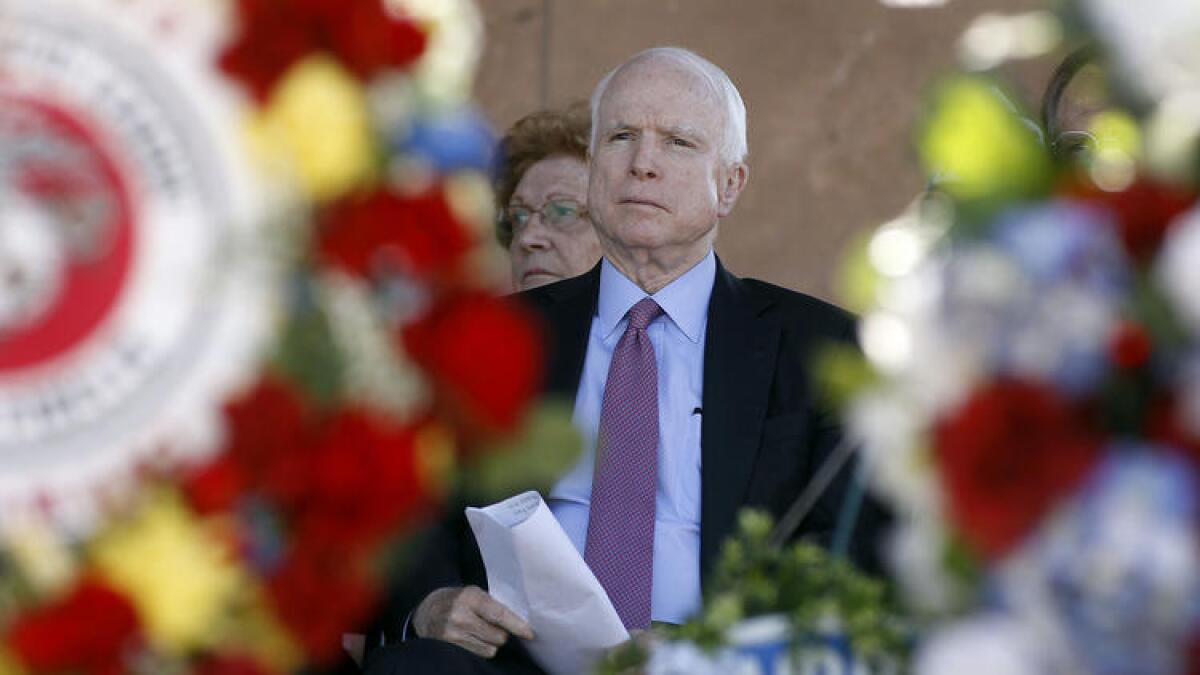
Tuesday is primary day in key states, and the results will provide an early look at Donald Trump and Hillary Clinton’s down-ballot effect in congressional elections ahead of November.
Races in Florida and Arizona are the ones to watch as Sens. Marco Rubio (R-Fla.) and John McCain (R-Ariz.) try to fend off Trump-inspired challengers for the GOP nomination.
Both McCain and Rubio are favored to blow past the upstarts as they run campaigns aligned with -- but separate from -- Trump.
Rubio faces wealthy developer Carlos Beruff, who has been needling the senator for flip-flopping on his decision to seek reelection after his failed presidential bid. McCain squares off against Kelli Ward, who has made an issue of his age: The Vietnam veteran turned 80 this week.
But how the incumbent senators handle the Trump enthusiasts in their party will set the stage for a November showdown, when both face tough races with Democrats that could determine control of Congress.
Both men have endorsed Trump, albeit somewhat halfheartedly. Trump, in return, has endorsed both Rubio and McCain in their primary battles, despite his blistering personal attacks against both men in the past.
Trump has been a down-ballot drag on some candidates as they struggle to appeal beyond the GOP base to voters statewide, but not necessarily for Rubio and McCain.
On the Democratic side, a similar dynamic is underway.
Florida Rep. Debbie Wasserman Schultz, the former head of the Democratic National Committee who resigned from that post amid criticism of favoritism for Clinton, is trying to beat back pro-Bernie Sanders challenger Tim Canova in her Florida district.
In the Florida race for Rubio’s Senate seat, the Democratic favorite is establishment-backed Patrick Murphy, but the congressman is being challenged by firebrand liberal Rep. Alan Grayson.
- Share via
Huma Abedin is Hillary Clinton’s closest aide, and now she might be a liability
Before any of former U.S. Rep. Anthony Weiner’s creepy sexting even came to light, his wife had attracted unwanted attention for her boss, Hillary Clinton.
Huma Abedin is a favorite target of Republicans. They accuse her of being a Saudi spy, a self-dealing insider, the mastermind behind a plot to hide Clinton’s email.
But the noise around Abedin was so often distorted by conspiracy theories that the public seemed to tune it out — until Weiner suddenly appeared back in the spotlight with the revelation of his most disturbing Twitter message yet: an illicit photo in which his son was a prop, sent privately to another woman. Abedin announced Monday that she and Weiner would separate.
Now, Clinton’s campaign finds itself unable to duck unwanted attention drawn to Abedin, a 40-year-old aide closer to Clinton than anyone else on her payroll.
- Share via
Inside the Hollywood past of Stephen K. Bannon, Donald Trump’s campaign chief
“The Indian Runner” was a Sean Penn-directed drama about the troubled relationship of two brothers, one a small-town sheriff, the other a Vietnam veteran turned criminal.
Released in 1991, the film, which cost an estimated $7 million to produce, was a flop, grossing $191,125 in the U.S. and Canada.
That made for an unremarkable outcome in a business where failure is common. Now, however, the movie has become notable for one of the people listed in the credits: Stephen K. Bannon.
“The Indian Runner” was the first film executive produced by Bannon, 62, who is now chief of Donald Trump’s presidential campaign. Bannon was involved in securing the movie’s financing, which came from Japanese media company NHK Enterprises.
- Share via
What does Trump mean when he says he will deport ‘criminal’ immigrants first?
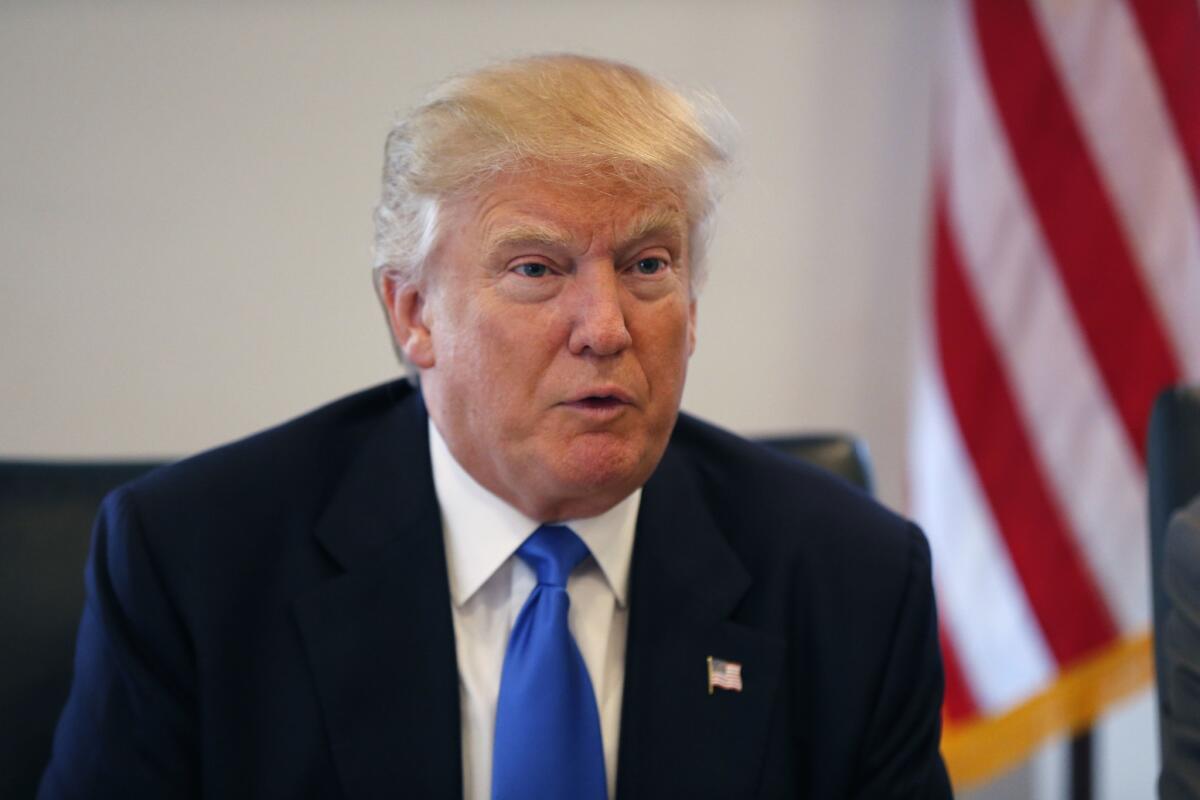
During a week of ping-ponging immigration stances, Donald Trump appears to be shifting his position from one which initially called for the deportation of all 11 million people here illegally to one that would focus on “criminal” immigrants.
Though it is true that some in the U.S. illegally have criminal records, the majority of those have violated only immigration laws or committed other nonviolent offenses, not the murders and assaults that Trump often brings up during stump speeches.
After a backlash from supporters worried he is backing down on a key campaign promise, Trump is now said to be reconsidering his change in policy. He is expected to outline his ideas Wednesday during a speech in Arizona.